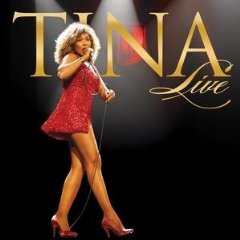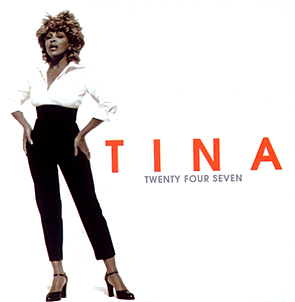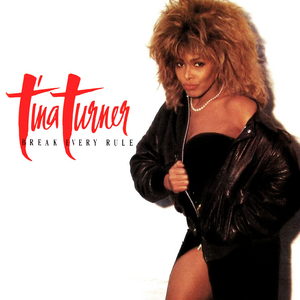best Tina Turner songs (A-Z) ↓↓↓

Scroll down and discover the best Tina Turner songs (A-Z)!
We've meticulously organized our extensive library for your convenience. Explore best Tina Turner songs sorted by popularity to easily find the tracks that resonate most with listeners, or browse through our alphabetical (A-Z) listing to discover hidden gems and classic favorites alike. Whether you’re a long-time fan or new to Tina Turner music, there’s something for everyone to enjoy.
♫Tina Turner
Best Tina Turner songs
A-Z songs of Tina Turner (139)
Albums of Tina Turner
Tina Turner info & bio
 Tina Turner (born Anna Mae Bullock; November 26, 1939 – May 24, 2023) was a singer, songwriter, and actress. As a rock icon, her vocal prowess, raspy vocal delivery, electrifying stage presence, live performance record and breaking the color barrier as an artist in rock helped her to be dubbed the "Queen of Rock 'n' Roll". Turner rose to prominence as the lead singer of the husband-wife duo Ike & Tina Turner. Their tumultuous marriage led to a divorce and disbanding in 1976, and she embarked on a successful solo career, becoming one of the best-selling recording artists of all time, with estimated sales of 100 to 150 million records worldwide.
Tina Turner (born Anna Mae Bullock; November 26, 1939 – May 24, 2023) was a singer, songwriter, and actress. As a rock icon, her vocal prowess, raspy vocal delivery, electrifying stage presence, live performance record and breaking the color barrier as an artist in rock helped her to be dubbed the "Queen of Rock 'n' Roll". Turner rose to prominence as the lead singer of the husband-wife duo Ike & Tina Turner. Their tumultuous marriage led to a divorce and disbanding in 1976, and she embarked on a successful solo career, becoming one of the best-selling recording artists of all time, with estimated sales of 100 to 150 million records worldwide.
In 1984, Tina launched "one of the greatest comebacks in music history", with her multi-platinum album Private Dancer. Its single "What's Love Got to Do with It" won the Grammy Award for Record of the Year and became her only number-one song on the Billboard Hot 100. Turner's chart worldwide success continued with "Let's Stay Together", "Better Be Good to Me", "Private Dancer", "We Don't Need Another Hero (Thunderdome)", "It's Only Love", "Typical Male", "The Best", "I Don't Wanna Lose You", "I Don't Wanna Fight", and "GoldenEye". Her Break Every Rule World Tour (1987–1988) became the highest-grossing female tour of the 1980s and set a Guinness World Record for the then-largest paying audience in a concert (180,000).
Turner continued her success as a live performer with Wildest Dreams Tour (1996–1997), the second highest-grossing female tour of the 1990s, and Twenty Four Seven Tour (2000), the highest-grossing tour of the year in North America. In 2009, she retired after completing her Tina!: 50th Anniversary Tour Turner's seven career tours from 1985 to 2009 attracted a combined audience of 18 million people worldwide. Outside of music, Turner acted in the films Tommy (1975), Mad Max Beyond Thunderdome (1985) and Last Action Hero (1993). Her life and career were dramatized in the film What's Love Got to Do with It (1993), based on her autobiography I, Tina: My Life Story (1986). Turner was also the subject of a jukebox musical, Tina (2018), and a documentary film of the same name (2021).
Turner received 12 Grammy Awards, which include eight competitive awards, a Grammy Lifetime Achievement Award and three Grammy Hall of Fame inductions. Rolling Stone ranked her among the greatest artists and greatest singers of all time. She was the first black artist and first woman to be on the cover of Rolling Stone, the first female black artist to win an MTV Award, the first woman to accumulate US$100 million in concert revenue and first woman to have cumulative concert sales from 1985-2000 tours exceeding US$450 million (equivalent to $1,231 billion in 2024), the first solo artist with UK top 40 singles across seven decades. Turner has a star on the Hollywood Walk of Fame and on the St. Louis Walk of Fame. She was inducted into the Rock and Roll Hall of Fame twice: with Ike Turner in 1991 and as a solo artist in 2021. She was also a 2005 recipient of the Kennedy Center Honors and the Women of the Year award.
Tina Turner videos are courtesy of YouTube
 Tina Live (2009)
Tina Live (2009) Twenty Four Seven (1999)
Twenty Four Seven (1999) Wildest Dreams (1996)
Wildest Dreams (1996) What’s Love Got to Do with It (1993)
What’s Love Got to Do with It (1993) Foreign Affair (1989)
Foreign Affair (1989) Tina Live in Europe (1988)
Tina Live in Europe (1988) Break Every Rule (1986)
Break Every Rule (1986) Mad Max Beyond Thunderdome (1985)
Mad Max Beyond Thunderdome (1985) Private Dancer (1984)
Private Dancer (1984) Love Explosion (1979)
Love Explosion (1979) Rough (1978)
Rough (1978) Acid Queen (1975)
Acid Queen (1975) Tina Turns the Country On! (1974)
Tina Turns the Country On! (1974)